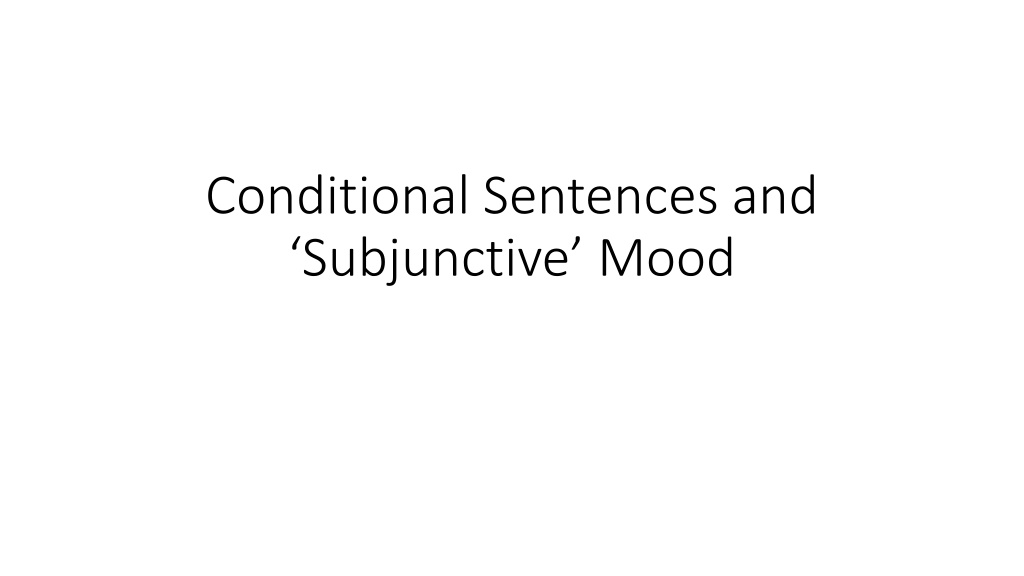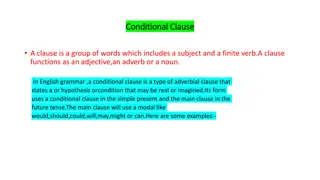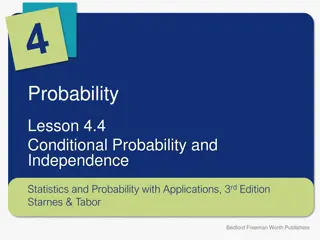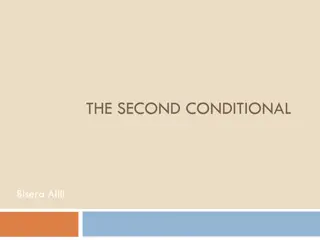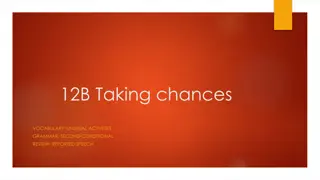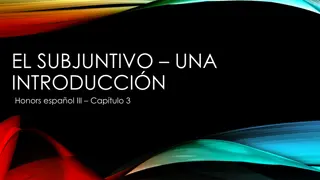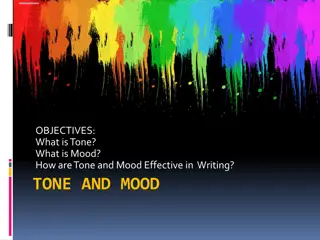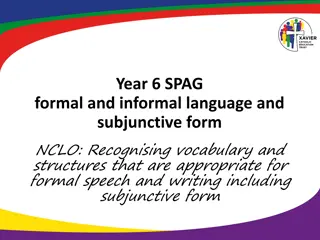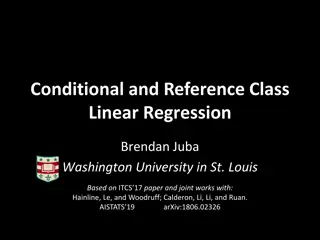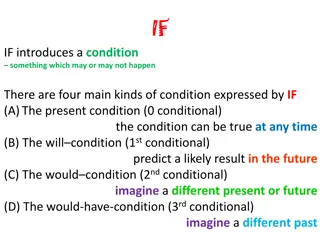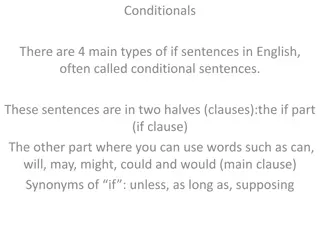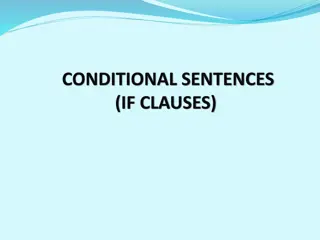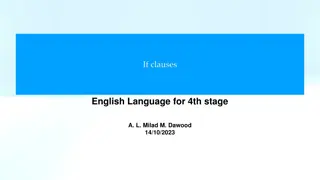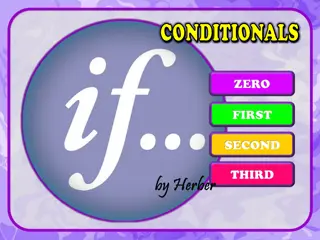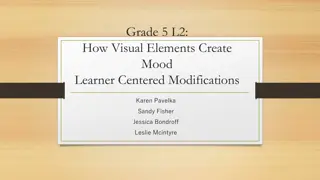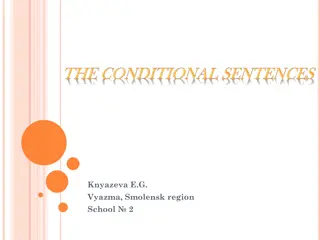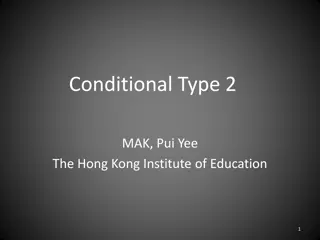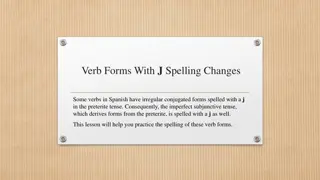Subjunctive Mood in Conditional Structures
Dive into the world of conditional sentences and the subjunctive mood. Explore how the hypothetical, unreal, or desired outcomes are expressed through specific verb forms. Learn the nuances of constructing sentences using the subjunctive mood in various conditional scenarios to effectively communicate different levels of possibility, uncertainty, or wishful thinking. Enhance your grasp of grammar rules and sentence structure through practical examples and explanations.
Download Presentation

Please find below an Image/Link to download the presentation.
The content on the website is provided AS IS for your information and personal use only. It may not be sold, licensed, or shared on other websites without obtaining consent from the author.If you encounter any issues during the download, it is possible that the publisher has removed the file from their server.
You are allowed to download the files provided on this website for personal or commercial use, subject to the condition that they are used lawfully. All files are the property of their respective owners.
The content on the website is provided AS IS for your information and personal use only. It may not be sold, licensed, or shared on other websites without obtaining consent from the author.
E N D
Presentation Transcript
Conditional Sentences and Subjunctive Mood
Conditional Sentences These are used to express that the action in the main clause (without if) can only happen if a certain condition is fulfilled (with if). With if , we can use would and the past tense to distance our language from reality, when we talk about present or future unreal situations. It is mainly used to express real situations with factual implications, or hypothetical situations and their consequences. There are 4 types of conditional clauses
Zero Conditional First Conditional Second Conditional Third Conditional Used for present, real situations Used for future, real situations Used for present, unreal situation Used for past, unreal situations. It is possible & also very likely that the condition will be fulfilled It is impossible that the condition will be fulfilled, due to reference to the past It is possible, but very unlikely that the condition will be fulfilled Form: Present simple + present simple Form: Form: Past simple + future with would Form: Present simple + future with will Past perfect + future perfect (would+have+pp)
Subjunctive Mood I wasa You were a He wasa We were a They were a If I werea If you were a If he werea If we were a If they were a The subjunctive mood is used in if clauses with the verb to be . It s used to express something contrary to fact, such as a wish, a suggestion, a command, or a condition.
Etymological Connections We compared conditional sentences and the subjunctive mood to German and French, because English is a Germanic language heavily influenced by French. If conditional sentences and the subjunctive mood were adopted from another language, it was most likely that they were adopted from German or French.
French The conditional sentences are more or less the same in French. They have First Conditional through to Third Conditional, just like we do. They also Zero Conditional, although it s not counted as a type of conditional. I was a butterfly. J tais un papillon. If I were a butterfly. Si j tais un papillon. In the English, the verb form changes from was to were . In the French, the tais remains the same.
German Subjunctive Conditional The conditional tense is used for the same purpose in German. It is used to talk about things which might happen, but are not certain. This usually uses the verb would ( werden ) Form: A pronoun/noun + conditional form of werden (w rden) + an infinitive (which goes at the end of the sentence) In German, the subjunctive mood comes in 2 varieties. The subjunctive I (present subjunctive) and subjunctive II (past subjunctive). Subjunctive I is mostly used when someone has told you something that may or may not be true. Subjunctive II is mostly used to express uncertainty, doubt or a contrary to reality. Wenn ich mehr Zeit h tte, w rde ich Tennis spielen 'If I had more time, I would play tennis'
Task: First: put the sentences below into the correct verb forms Second: Identify which conditional clause it is 1) If we (have) red curtains, the kitchen (look) better 2) If Andy (not get) the job, it (be) a pity 3) If you (use) a computer, it (be) quicker 4) I (show) you the cellar, If I (have) the keys. 5) If you (need) to buy a picture frame, where (you go)? 6) If I (be) rich, I (buy) that Ferrari we saw yesterday Second Task: Identify which sentences should be in the subjunctive mood, and then put them into it. (If you are unsure of the tense, make it present tense.) 1) If I (be) you, I wouldn t do that 2) Monsters would be real if science (be) more advanced 3) If you (be) to study English, we would be in your class 4) I (be) a pirate in a past life 5) (Be) the government corrupt?
